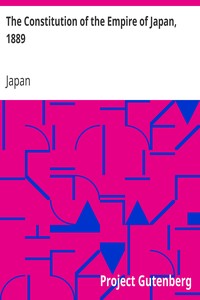| Author |
Japan |
| Title |
The Constitution of the Empire of Japan, 1889
|
| Note |
Japan. Kenpo (1889)
|
| Note |
Reading ease score: 44.9 (College-level). Difficult to read.
|
| Summary |
"The Constitution of the Empire of Japan, 1889" by Japan is a foundational legal document written during the late 19th century, specifically in the Meiji era. This work serves as a critical historical account that outlines the structure and principles of governance for Japan during a transformative period in its history. It addresses the organization of the imperial government, the rights and duties of subjects, and the legislative framework within which the Empire operated. The document begins with an imperial oath and a rescript that emphasizes the continuity of the emperor's sovereignty and the intended welfare of the subjects. It details the powers and responsibilities of the Emperor and establishes the bicameral Imperial Diet, which consists of the House of Peers and the House of Representatives. Fundamental rights of the subjects are also delineated, providing citizens with liberties such as freedom of speech, property rights, and legal protections. The Constitution thus serves not only as a governance framework but also as a reflection of Japan's modernization efforts, laying the groundwork for a more structured government while maintaining traditional imperial authority. (This is an automatically generated summary.)
|
| Language |
English |
| LoC Class |
JQ: Political science: Political inst. and pub. Admin.: Asia, Africa and Oceania
|
| LoC Class |
KNX: Law in general, Comparative and uniform law, Jurisprudence: Japan
|
| Subject |
Constitutional law -- Japan
|
| Subject |
Japan -- Constitution
|
| Category |
Text |
| EBook-No. |
613 |
| Release Date |
Aug 1, 1996 |
| Most Recently Updated |
Jan 1, 2021 |
| Copyright Status |
Public domain in the USA. |
| Downloads |
135 downloads in the last 30 days. |
|
Project Gutenberg eBooks are always free!
|

